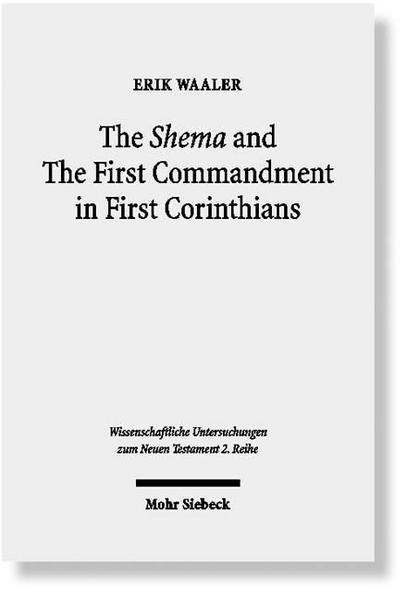WAALER,E., The Shema and The First Commandment in First Corinthians. Tübingen 20
The Shema and The First Commandment in First Corinthians. An Intertextual Approach to Paul’s Re-reading of Deuteronomy. 1. Aufl. Tübingen, Mohr Siebeck, 2008.
23 x 16 cm. XIII, 563 S. Fadenbindung. (Wissenschaftliche Untersuchungen zum Neuen Testament 2. Reihe, 253). ISBN 9783161498336.
Erik Waaler takes a somewhat modified intertextual approach to the relationship between Jewish monotheism and Pauline Christology. His focus is on Paul’s Christological reuse of Shema in 1Cor 8:1-6. He argues that the statement “there is no God but one” (8:4a) is a combined echo of Shema and the First Commandment, and that v. 4a might be associated with the Second Commandment. This fits with Paul’s constant use of Deuteronomy in 1Cor 5-10. Admittedly first century non-Christian Jews did not use the term one about other beings together with the one God, thus combined phrases such as ‘one God the Father and one Lord Jesus Christ’ are without Jewish parallels. Apart from this Christological twist, Paul’s reuse of such phrases is in line with Jewish custom. He uses phrases like one God and one Lord as arguments for unity, although he speaks of unity in the Church. In the Old Testament, themes like God’s fatherhood and His oneness are associated with creation and salvation. Paul echoes this, but when Shema let the phrase ‘one Lord’ signify Yahweh, Paul let it signify Jesus, who like Yahweh is contrasted to the idols. Additionally, both Shema and 1Cor 8:1-3 speak of love directed at God. The Christological twist is supported by Paul’s Christological re-interpretation of the divine epithet the Rock (Deut 32). In the context, Paul makes membership in the Christian in-group dependent on the confession: “Jesus is Lord.” Erik Waaler concludes that Paul in 1Cor 8:1-6 sustains a relatively high Christology. Paul achieves this effect by a contextual and binitarian re-reading of Shema.
Order Number: 2043VB
Fixed Retail Price: EUR 119,--

